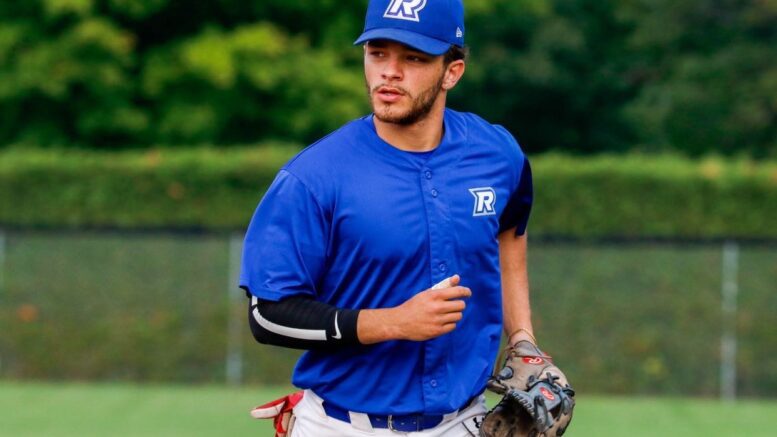The physical and emotional strain that is put on male athletes is often overlooked, and builds a dangerous stigma that men should be “strong” and “masculine,” a psychotherapist specialized in men’s mental health said.
According to mental health and suicide statistics in Canada, of the estimated 4,000 deaths by suicide a year, 75 per cent are men. A 2021 report of men’s mental health in sport found that, “68 per cent of elite athletes experience depressive symptoms,” and many factors contribute, such as injuries, overtraining, and the need to perform and succeed.
Thomas Markus, 20, is a shortstop and second base for the Toronto Metropolitan University men’s baseball team. He said that, “the expectations that society has set on men and their emotions is one of the biggest factors why suicide rates for men are so high.”
As a leader on his team, Markus said he feels it is important for him to come across as “strong” and “fearless” to his teammates. In the past, it was difficult for him to speak up about mental health, but after losing a close friend to suicide in the summer, Markus said that having someone to talk to in times of hardships can “make a world of a difference.”
Pressure to be ‘the best’
An expert said men are raised with specific ideas about what men should and should not be.
“Men have often historically been socialized into roles where they are given strong explicit and implicit messages to be ‘tough,’ to ‘have things together,’ and to demonstrate confidence and capability,” Shlomo Radcliffe, a psychotherapist and clinical director of Shlomo Radcliffe & Associates, said.
In sport, Radcliffe said these social constructs are often heightened because of the pressures that athletes already put on themselves to be successful or to be “the best.” If athletes believe that their mental health is getting in the way of their success, they will try to avoid their mental-health issues altogether and pretend that they do not exist.
Although men’s mental health has gained more media attention over recent years, a 2018 review of men’s mental health and sport studies said this is not enough and, “further research and education is needed to encourage men to talk about their mental health, share their experiences and to enjoy a greater sense of emotional wellbeing.”
640 stressors
This study said injury, stress, and overtraining are three major factors that cause mental illnesses in male athletes. Sports medicine experts said injury in elite athletes causes psychological distress and may increase the risk of depression and anxiety in athletes.
“A professional sports career can include in excess of 640 stressors that may induce common mental disorders,” as elite athletes experience an increased amount of physical and mental strain.
Overtraining syndrome (OTS) is a term used to describe how an athlete’s body, “attempts to cope with physiological and other stressors including physical training, sleep loss, exposure to environmental stressors, occupational pressures, change of residence, and interpersonal difficulties,” said sports medicine experts.
Many athletes experience OTS due to their demanding training schedules and can fall to symptoms similar to depression, such as, “fatigue, insomnia, appetite change, weight loss, lack of motivation and concentration difficulties.”
Markus said he absolutely thinks mental health issues can affect an athlete’s performance.
“As much as sports are physical, they’re extremely mental,” Markus said. “How are you supposed to battle on the field when you are already internally battling with yourself?”
“I also know that the pressure of varsity and competitive sports can take a toll on your mental health,” he said. “Especially when you combine the pressure of sports with everything else in life like school, work, family and whatever else, it can build up on your shoulders and weigh you down.”
David DeAveiro, head coach of TMU men’s basketball team, said that in his experience, male athletes are often made aware of the resources and help that are available, but the pressure they put on themselves to perform well, and their fear of failure, are detrimental.
“The levels of excellence that they are trying to achieve are not real,” he said.
Developing coping strategies
One way to break free of the harmful stigma surrounding men’s mental health is to develop and work towards healthier coping mechanisms for when an athlete is having a bad day, a bad game, or feeling unsuccessful, said DeAveiro. “Self-reflection and being honest with yourself,” are very important factors in coping with mental health, he said.
Radcliffe said it is important for athletes to accept that they are struggling, and understand that it is OK to need help from the people around them.
“Dealing with mental health difficulties does not mean you need to drop the goals that are important to you,” he said. “It just makes you more likely to have the space, capacity, and sense of vitality that allows you to reach them.”
There are many resources for male athletes struggling with mental health and experts encourage them to reach out to a trusted source, whether that be a friend, teammate, coach, or psychotherapist. Athletes are also urged to reach out to the mental health support provided by their schools.
The Government of Canada also provides national services and links to provide mental health support to men across the country looking to speak to a professional and get help that is constructed to each individual’s needs.
If you are in crisis and need support, you can speak to someone 24-hours a day at the Toronto Distress Centre, at 416 408-4357 or 408-HELP

